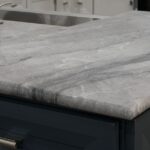Ever since COVID-19, cleaning and disinfecting have never been more distant terms. In our homes, while cleaning is usually tied to routine care, disinfecting carries a more specific connotation – a deeper one. It doesn’t mean just killing bacteria and organic residue atop surfaces, but completely removing any leftover substances that might be stuck on them. If you’re here, you’re probably wondering how to disinfect marble countertops in your kitchen or bathroom – chances are they haven’t been cleaned for a while, so why not?
In this article, we’ll explain to you how to do that without causing permanent damage to your marble slab. If you’d like to read our full guide on marble cleaning, click here instead.
How to disinfect marble countertops
Disinfecting marble countertops requires a bit of care. Compared to other natural stones such as quartzite – which has a straight, sturdy surface – marble is porous and sensitive, which means it can be damaged by harsh chemicals and abrasive cleaners.
And speaking about cleaners, in order to disinfect a marble surface, you must first choose between homemade solutions or commercial ones. Both are very effective, so it depends on the level of cleaning you’d like to achieve. If you’re willing to go for a nice marble cleaner at the nearest hardware or construction store, we can list a few recommended options for you:
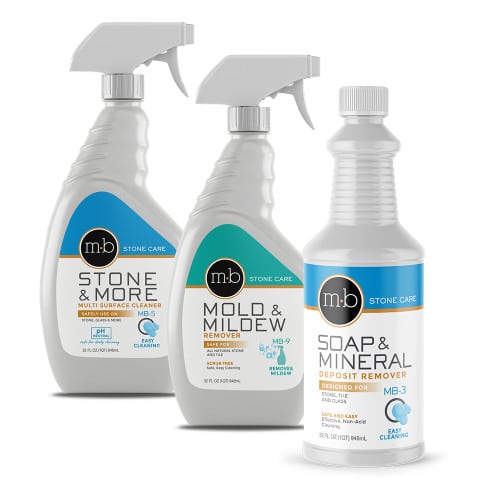
- MB Stone Care’s MB-5 Marble Spray Cleaner; with a non-streak formula, this cleaner comes from a rich, reputable company in the marble industry and will get rid of dirty spots with ease.
- MarbleLife’s Marble and Travertine Cleaner; this one can be used on tiles, showers, and grouts, also being pet-friendly and easy to use – just spray and swipe, then flip your cloth to buff dry.
- Weiman Marble and Granite Cleaner; it’s made for many surfaces in your home, with a formula that kills 99.9% of germs and bacteria on sealed stone surfaces, including granite, marble, limestone, slate, and glazed tile.
To learn how to disinfect marble countertops safely, follow these steps:
- Gentle cleaning: Start by wiping down the countertop with a soft, damp cloth or sponge to remove any surface dirt and debris. Use warm water and a mild, pH-neutral dish soap or your cleaner of choice. Avoid acidic or abrasive cleaners, such as vinegar, lemon juice, or abrasive scouring pads, as they can etch or damage the marble’s surface.
- Rinse thoroughly: After cleaning, rinse the countertop thoroughly with clean water to remove any soap residue.
- Disinfection: To disinfect the marble, you can use a mixture of water and isopropyl alcohol (70% or higher). Mix one part alcohol with one part water in a spray bottle.
- Spray and wipe: Lightly mist the countertop with the alcohol-water solution, ensuring even coverage. Allow it to sit on the surface for a few minutes (typically around 5 minutes) to effectively disinfect.
- Wipe dry: Use a clean, soft, lint-free cloth or paper towel to wipe the countertop dry. Make sure there’s no standing liquid left on the surface, as prolonged exposure to moisture can damage marble.
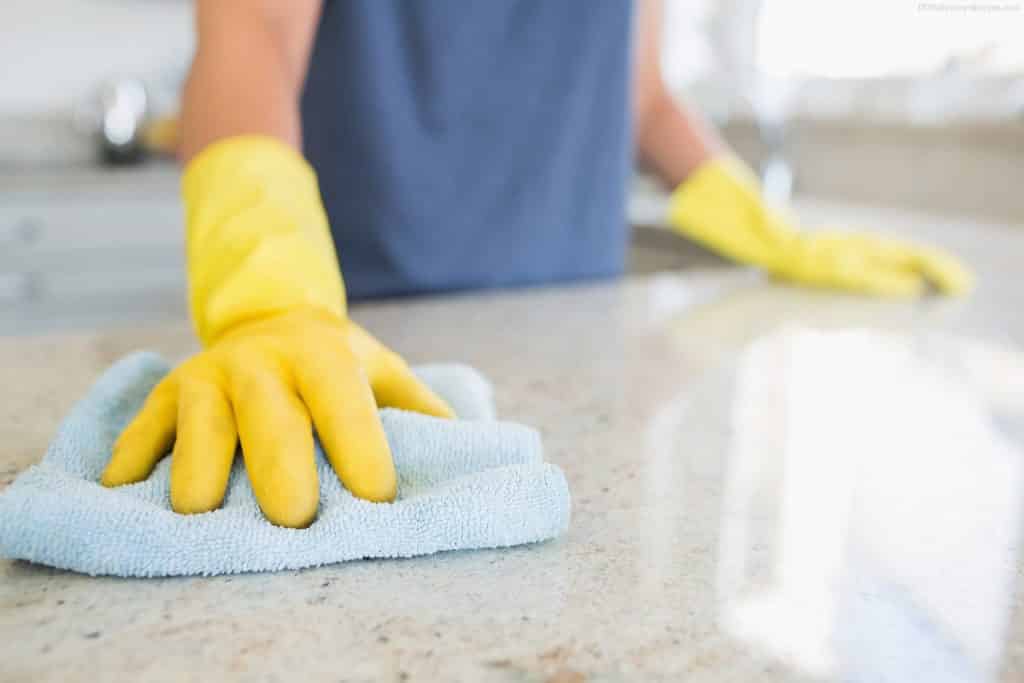
Some extra tips to maintain the beauty of your marble countertops include the use of coasters for drinks, trivets, or hot pads for hot cookware, and avoiding spilling acidic substances (like citrus juices) directly on the surface. Over time, you should clean up spills promptly to prevent staining – or, as we’ll see in the section below, even worse problems.
Why maintenance is important for natural stones
While marble countertops are stunning, they are also susceptible to damage from everyday activities. Any natural stone is delicate, after all, and given the fact that most marble slabs are placed in high-traffic areas such as kitchens and bathrooms, its surface will be heavily depended on.
To keep your marble surfaces looking their best, be mindful of the following factors that can cause stains, scratches, cracks, and fading:
- Stains: Acidic substances like citrus juices, vinegar, and red wine can etch the marble and cause stains. Wipe up spills promptly and avoid placing items directly on the countertop without coasters or trivets.
- Scratches: Of course, sharp objects can scratch the marble’s surface. Always use cutting boards and avoid sliding heavy or abrasive items across the countertop.
- Cracks: Marble is relatively soft and can crack under pressure, so avoid dropping heavy objects onto the countertop and be cautious with pots and pans.
- Fading: Prolonged exposure to direct sunlight can cause the stone to fade over time. Consider using curtains or blinds to shield your countertop from excessive sunlight.
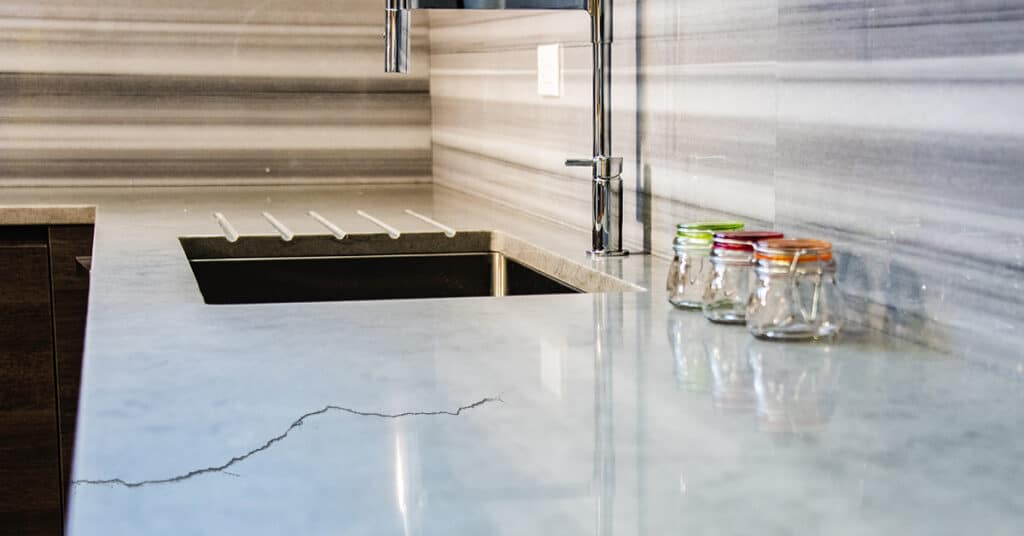
Read as well: Tips on How to Restore Marble Countertops
Sealing marble countertops
Is sealing marble really necessary? Well, yes. Even after thorough cleaning and disinfecting, getting your hands on a sealer is key to preserving the lifespan of your investment.
You see, marble is a porous stone – which means it has tiny openings that can absorb liquids and stains. Without a proper sealer, everyday substances like wine, juice, and oil can penetrate its surface, leaving behind unsightly stains that are difficult to remove by conventional means, let alone disinfect.
Additionally, marble is susceptible to etching, which occurs when acidic substances, such as lemon juice or vinegar, react with the calcium carbonate in the stone, causing dull spots or marks. A high-quality marble countertop sealer acts as a protective barrier, preventing any kind of liquid from seeping into the stone, thus reducing the risk of both staining and etching in the long run.
By investing in a marble countertop sealer, owners of porous natural stones can ensure the longevity and beauty of their countertops. Learn how to seal marble countertops in this article.
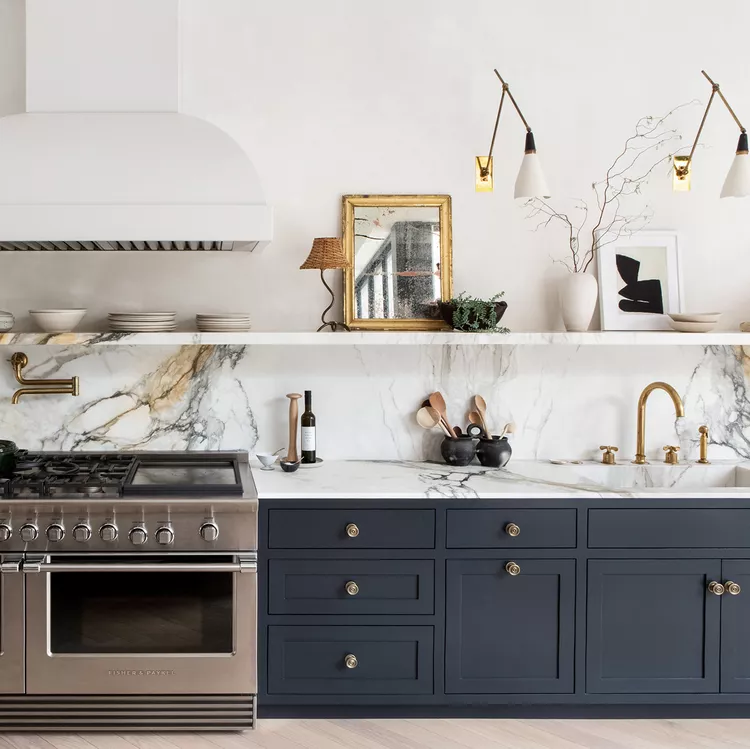
Get a team who can restore your marble for you!
So, now you know how to disinfect marble countertops in your house – and how to take good care of them over time.
However, if you’ve never sealed or deep-cleaned marble before, the process might be pretty difficult, especially if stains, cracks, or scratches are around. A lot can go wrong, you see: you may end up damaging your product even further, which compromises the lifespan of your expensive home investment.
You don’t want that.
Therefore, to ensure everything goes well – and that your marble countertop comes out looking better than ever – get a professional maintenance job. If you’re trying to repair marble counters for the first time, you’ll probably get it wrong and need someone to fix it, which will lead you to an expert anyway. A professional job ends up saving you money, you see!
Here at Eagle Stones, we specialize in marble slabs from all over the globe, so we can help you out. If you live near Sarasota, Florida, get in touch – and we can send a specialist to help figure out the best way to deal with your marble counter. Check out our services by clicking here.

